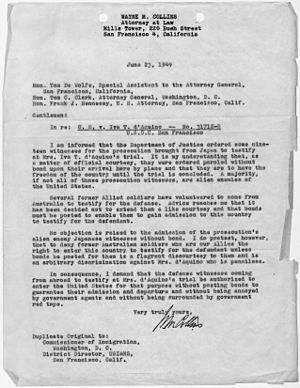Wayne M. Collins facts for kids
Quick facts for kids
Wayne M. Collins
|
|
|---|---|
| Born | November 23, 1899 |
| Died | July 16, 1974 (aged 74) |
| Nationality | American |
| Occupation | Civil Rights Attorney |
Wayne Mortimer Collins (November 23, 1899 – July 16, 1974) was an American attorney who dedicated his life to fighting for civil rights. He is best known for his important work helping Japanese Americans who were unfairly treated during and after World War II.
Contents
Wayne Collins: A Champion for Justice
Early Life and Education
Wayne Collins was born in Sacramento, California, in 1899. He grew up in San Francisco. When he was young, his father passed away, and he spent some of his childhood in a special home linked to the Swedenborgian Church. He went to Lick-Wilmerding High School and later joined the Navy during World War I.
After the war, Wayne Collins studied law at San Francisco Law School, earning his degree in 1927. The next year, he opened his own law office in San Francisco. He was a kind and supportive person, and in 1930, he was able to help his mother and younger brother financially. In 1933, he married Thelma Garrison, and they had two children.
Starting His Legal Career
In 1934, Wayne Collins helped create the Northern California branch of the ACLU. This group works to protect people's rights. He joined because he saw how workers in California were being treated unfairly.
One of his first big cases for the ACLU was helping a nine-year-old Jehovah's Witness child. The child had been suspended from school for not saying the Pledge of Allegiance because of their religious beliefs. Collins stood up for the child's right to freedom of religion.
Fighting for Japanese Americans
Wayne Collins became a leading lawyer in the fight against the unfair treatment of Japanese Americans during and after World War II.
Helping Fred Korematsu
During World War II, many Japanese Americans were forced to leave their homes and live in special camps. This was called the Internment of Japanese Americans. Wayne Collins, along with Ernest Besig from the ACLU, took on the case of Fred Korematsu. Fred Korematsu challenged the government's order, saying it was against the Constitution.
In 1944, Collins argued Fred Korematsu's case before the U.S. Supreme Court. Sadly, the Supreme Court decided against Korematsu at that time. However, nearly 40 years later, in 1983, a court officially overturned Korematsu's conviction, proving that what Collins fought for was right all along.
Supporting Tule Lake Internees
In 1944, Collins learned about a special area at the Tule Lake Segregation Center where Japanese American internees were held without proper legal reasons. He used legal threats to get this area closed down. When it was reopened, he went back and made sure it was closed for good.
After the war, many Japanese Americans at Tule Lake had been tricked or forced into giving up their American citizenship. This was a very serious problem. Starting in 1945, Wayne Collins began helping these people. He filed many lawsuits to get their American citizenship back. He argued that it was wrong for the government to take away citizenship from people who were held against their will. A judge agreed with him, saying it was "shocking to the conscience" to force citizens to give up their rights while they were imprisoned.
Even though a court later said each case had to be decided separately, Collins spent 23 years fighting for these people. He filed thousands of court cases and successfully helped many Japanese Americans get their citizenship back.
Assisting Japanese Latin Americans
Wayne Collins also helped about 3,000 Japanese Latin Americans. These individuals had been brought to the U.S. during the war, often against their will. After the war, many were going to be sent away. Collins worked hard to help hundreds of them stay in America and make new lives here.
Defending Iva Toguri
In 1949, Wayne Collins, along with other lawyers, defended Iva Toguri D'Aquino. She was accused of being "Tokyo Rose" and was charged with treason. Despite unfair evidence, she was found guilty. After she was released from prison in 1956, Collins continued to work to clear her name.
Other Important Cases
Besides his work for Japanese Americans, Wayne Collins also took on other important legal cases. He helped the Swedenborgian Church with legal matters. He also defended some immigrants from India who faced deportation. He stood up for teachers who refused to sign a Loyalty oath#The University of Californialoyalty oath in California. He even defended leaders of the Free Speech Movement at Berkeley, who were fighting for their right to speak freely.
His Legacy and Passing
Wayne Collins passed away on July 16, 1974, after a heart attack while traveling. His son, Wayne Merrill Collins, continued some of his father's cases. This included working to get a presidential pardon for Iva Toguri D'Aquino, which President Gerald R. Ford granted.
Though not widely known to the public, Wayne Collins' tireless efforts for Japanese Americans have been honored. The poet Hiroshi Kashiwagi dedicated his book to Collins, saying he "rescued me as an American and restored my faith in America." Michi Nishiura Weglyn, who was interned herself, wrote that Collins "did more to correct a democracy's mistake than any other one person." His work shows how one person can make a huge difference in protecting the rights of others.
Research resources
 | Sharif Bey |
 | Hale Woodruff |
 | Richmond Barthé |
 | Purvis Young |


